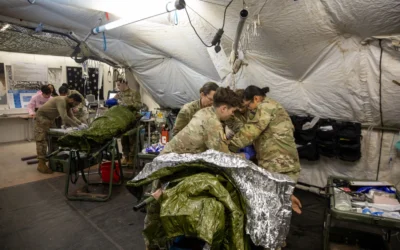When evaluating airway obstruction in military personnel after deployment, impulse oscillometry (IOS) may serve as an additional diagnosis tool, but it can’t replace the reliability of the standard spirometric evaluation, according to a recent study.
Rural Veterans Have Less Access to Crucial COPD Therapies Post-Discharge
Chronic obstructive pulmonary disease, a group of progressive and complex conditions that affect the lungs, require a comprehensive treatment approach.
Oral, Intravenous Antibiotics, Both Effective in Treating Fracture-Related Infection
Both oral and intravenous antibiotics are effective after fracture-related infection (FRI), a serious complication following fracture fixation surgery, according to a recent study.
GOP Legislators Push Bill to Expedite Firing Authority for VA Employees
Republican legislators are again seeking to provide the VA secretary with expedited firing authority for VA employees that are deemed “bad actors.”
Martin Focuses on Improving Sleep-Disorder Treatment for Veterans
We spend approximately one-third of our lives asleep, but it’s only been in the last couple of decades that the medical community has begun to understand in detail just how important sleep can be to our lives.
Issues Weren’t That Different in VA 60 Years Ago
With news every day about VA staffing cuts, the cancellation of contracts and, essentially, the way the agency does business, it is interesting to look back to what might seem to us as a simpler time – 60 years ago, when U.S. Medicine began.
A Range of Factors Put Veterans at Higher Colorectal Cancer Risk
Colorectal cancer (CRC) remains a major health threat in the United States, ranking as the fourth most common cancer among men and women combined.
VA Offers Pathway through First-Line Treatment Options for mCRC
The VA diagnoses approximately 4,000 new CRC cases annually. More than half of people with CRC either have metastatic disease at diagnosis or will develop it
The Importance of Hyperselection in Treating Metastatic CRC
Recent research in metastatic colorectal cancer (mCRC) demonstrates that personalized therapy outperforms broad approaches to treatment of this challenging malignancy in federal medicine and elsewhere.
Staying Ahead of EFGR Dermatological Toxicities in CRC
Epidermal growth factor receptor (EGFR) inhibitors such as panitumumab are pivotal in treating metastatic colorectal cancer (mCRC) patients with wild-type KRAS mutations in the first, second and third lines, especially in patients with wild-type RAS genes.
New Treatment Options Extend Survival for Veterans with DLBCL
Diffuse large B-cell lymphoma (DLBCL) is the most prevalent subtype of non-Hodgkin lymphoma (NHL), characterized by its aggressive nature.
Exposures Increase DLBCL Risks for Veterans, Servicemembers
Exposure to a wide range of chemicals and radiation has long been known to increase the risk of developing diffuse large B-cell lymphoma (DLBCL).
Survival Improving for Most Common Lymphoma Diagnosed in Veterans
Diffuse large B-cell lymphoma (DLBCL) is the most common type of lymphoma diagnosed in active-duty servicemembers and veterans. Fortunately, advances in understanding of the disease are leading to more targeted and effective therapies and improved survival rates.
‘Tip of the Spear’
Throughout my military career, I would hear the phrase ‘tip of the spear’ to describe units or leaders who were first to the fight. The metaphor refers to the business end of one of the oldest weapons of warfare, the spear. As Madeline Miller in “The Song of Achilles” says, “You can use a spear as a walking stick, but that will not change its nature.” Everyone understands what the spear represents and what it is for. As military medical physicians, we often discuss our role as the “soft side of the spear.” We were not at the pointy end, but we certainly supported the effective implementation and application of force embodied by the spear tip.
VA Urged to Avoid Large Monolithic IT Projects, Use a More Modular Approach
Legislators, agency watchdogs and VA leaders are in agreement: The department must stop investing in massive, multiyear IT projects whose intention is to solve a technology need in one fell swoop.
VA EHR Rollout Will Resume in 2026 at Several Michigan Sites
VA has announced that it is planning to restart the rollout of its electronic healthcare record modernization project in mid-2026, starting with four facilities in Michigan—Ann Arbor, Detroit, Battle Creek and Saginaw.
Chemoprophylaxis Is Likely Safe if Started 72 Hours After TBI, but Evidence Lacking for Earlier Use
Prophylaxis for venous thromboembolism (VTE) is crucial in people who have had traumatic brain injuries (TBIs), due to their heightened risk caused by immobility, inflammation and coagulation system activation.
Opioid-Use Disorder Prevalence Declined Since 2017, Especially in Black, Hispanic and Younger Veterans
After peaking at 1.16% in 2017, the prevalence of opioid-use disorder (OUD) among VHA patients declined steadily and was 0.97% in 2022, the most recent date for which data is available.
Soft-Tissue Sarcoma Rates Higher in Middle-Aged Servicemembers
While the incidence rates of soft-tissue sarcomas are lower in young U.S. active-duty military servicemen compared with those in the general population, according to a new study, those are higher in middle-aged servicemen, possibly because of greater cumulative exposure to toxins.
Large Analysis of Veterans With Diabetes: More Benefits with GLP-1RA, Especially Neurological
While glucagon-like peptide-1 receptor agonists (GLP-1RA) are known to successfully treat diabetes and aid weight loss, they also have other widespread benefits, including for cognitive and behavioral health.
Vascular Comorbidities Affect Functionality in Multiple Sclerosis Patients
Do multiple sclerosis patients with a vascular comorbidity such as hypertension, hyperlipidemia, heart disease and diabetes have more issues with functional activities, and how does that relate to disability, depression and fatigue?
Use of Botulinum Toxin for Headaches Under-Researched in Servicemembers, Veterans
A new study spotlighted the trend of using botulinum toxin, including onabotulinum toxinA (OTA), in active military personnel and veterans who have been diagnosed with migraine and post-traumatic headache (PTH). The article in the Journal of Pain Research also sought to describe the efficacy of botulinum toxin administration.
Long-term Opioid Use Can Lead to Neurocognitive Symptoms
Opioid-related harm might be signaled early on by neurocognitive symptoms (NCS).
Concerns Raised About Severe Allergic Reactions in Outdoor Military Personnel
Tick bites in U.S. military personnel are leading to the development of antibodies to alpha-gal, a molecule found in most mammals, and possibly alpha-gal syndrome, a serious, potentially life-threatening allergic reaction.
Record Number of Benefits Claims Relate to Military Sexual Trauma
The end of 2024 saw a record number of servicemembers filing VA benefits claims related to military sexual trauma. According to VA leaders, that is the result of increased outreach by the department.
Differing Definitions of Symptoms Might Delay Migraine Diagnosis
Headaches are an almost universal experience, affecting approximately 96% of people globally at some point in their lives. Migraines, with a lifetime prevalence of 12.9% to 15.2%, consistently rank among the top three leading causes of disability for both men and women.
Memory Recall Differs Across Common Neurological, Psychiatric Conditions
Memory performance is a vital cognitive function crucial for daily life and overall well-being. Impairments in memory are associated with various neurological, neurodevelopmental and neuropsychiatric disorders.
Bipolar Disorder Symptoms Linked to Sleep Disturbance, Cannabis-Use Disorder
In bipolar disorder patients, having cannabis-use disorder and a natural tendency to go to sleep and awaken late are associated with more severe mood symptoms, according to a recent study.
Outgoing VA Secretary McDonough Concerned About Budget, Slow Hiring
In his final press conference, VA Secretary Denis McDonough discussed what he thinks should be the top priority for incoming department leaders.
Frailty Assessment Can Improve Decision-Making for Older NSCLC Patients
Frailty indices predict overall survival and toxicity among older adults with cancer receiving chemotherapy.






